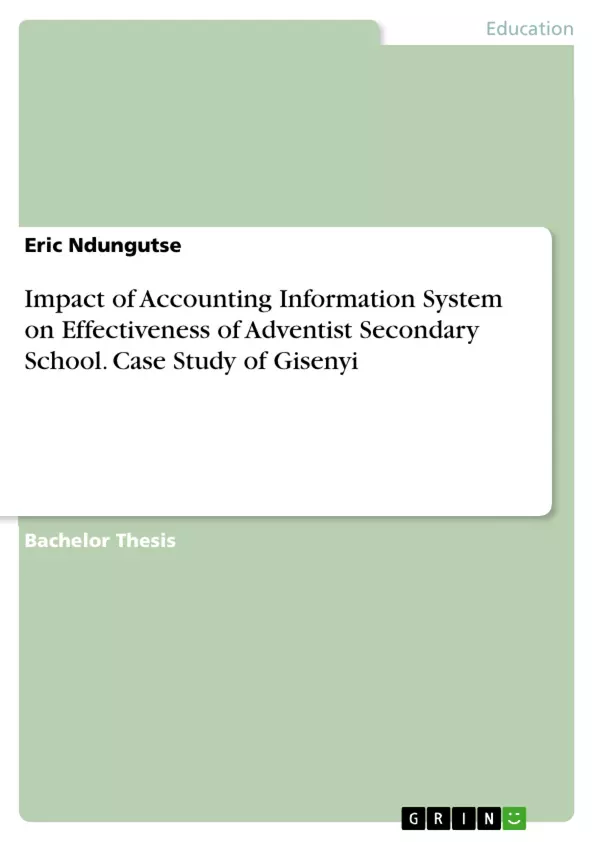The main objective of this study is to examine the impact of accounting information system on effectiveness of secondary schools specifically in Gisenyi Adventist Secondary School. The study was carried out in Gisenyi Adventist Secondary School and both descriptive and multiple regression were used in the course of the study. The sample size of 30 was obtained from known population where the researcher approached them with questionnaires and asked them randomly to answer the prepared questions. The data collected from the respondents were recorded and analyzed using SPSS version 20 and the results were interpreted through frequencies, mean, standard deviation and multiple regression.
School effectiveness refers to the extent to which schools are able to accomplish their pre-determined objectives. School effectiveness transcends beyond students passing final examinations. According to School effectiveness has become an area of major concern for educational research from the sixties onwards in the United States. These studies have tended to focus on secondary school effectiveness till 1980. We aimed at studying a variety of effectiveness criteria. As in some other effectiveness studies, we explicitly studied not only student achievement, but also noncognitive outcomes. The mathematics and the language achievement was measured by means of curriculum relevant multiple choice tests at the start of the secondary school and at the end of the first, the second, the fourth, and the sixth grade. The questionnaire with regard to the noncognitive outcomes was also administered several times during the students' secondary school career.
Table of Contents
- ABSTRACT
- DEDICATION
- TABLE OF CONTENTS
- LIST OF TABLES
- LIST OF ABBREVIATIONS
- ACKNOWLEDGEMENT
- CHAPTER 1
- INTRODUTION
- Background of the Study
- Statement of the Problem
- Research Questions
- Objectives of the Study
- General Objective
- Specific Objectives
- Hypothesis
- Significance of the Study
- Justification of the Study
- Conceptual Framework
- Delimitation (scope) of Study
- Limitations of the Study
- Definition of Key Terms
- CHAPTER 2
- REVIEW OF RELATED LITERATURE AND STUDIES
- Conceptual Review
- Accounting Information System
- Theoretical review
- Contingency Theory
- Activity Theory
- Innovation Diffusion Theory
- Empirical Review
- Gap Analysis
- CHAPTER 3
- RESEARCH METHODOLOGY
- Research Design
- Population and Sampling Techniques
- Population
- Sample size
- Sampling Techniques
- Research Instrument
- Data Gathering Procedures
- Statistical Treatment of Data
- Mean (M)
- Coefficient of Variation (CV)
- Multiple Regressions
- Ethical Considerations
- CHAPTER 4
- PRESENTATION, ANALYSIS AND INTERPRETATION OF FINDINGS
- Demographic Information of Respondents
- Marital status of respondents at Gisenyi Adventist Secondary School
- Age group of respondents at Gisenyi Adventist Secondary School
- Experience of respondents at Gisenyi Adventist Secondary School
- The Perceptions of Respondents on Accounting Information System
- Perceptions of Respondents on Data Collection
- Perceptions of Respondents on Data Processing
- Perceptions of Respondents on Information Production
- The Perceptions of Respondents on Effectiveness
- Perception of respondents for School fees recovery
- Perception of Respondents on School Fees Recovery
- Perception of respondents for Timely financial statement
- Perception of respondents on Accuracy of financial statements
- Perception of Respondents on
- Testing Hypotheses
- Results for Hypothesis One
- Results for Hypothesis Two
- Results for Hypothesis Three
Objectives and Key Themes
This research aims to investigate the impact of accounting information systems on the effectiveness of secondary schools, focusing on Gisenyi Adventist Secondary School in Rwanda. The study utilizes both descriptive and multiple regression analysis to examine the relationship between accounting information systems and school effectiveness.
- Impact of accounting information systems on school effectiveness
- Factors influencing the effectiveness of accounting information systems in secondary schools
- The role of data collection, processing, and information production in accounting information systems
- The relationship between accounting information systems and school fees recovery
- The contribution of accounting information systems to the overall effectiveness of secondary schools
Chapter Summaries
- Chapter 1: This chapter introduces the research topic, outlining the background, problem statement, research questions, objectives, hypotheses, significance, justification, conceptual framework, delimitation, limitations, and definitions of key terms.
- Chapter 2: This chapter presents a comprehensive review of relevant literature and studies, examining conceptual and theoretical frameworks related to accounting information systems and their impact on school effectiveness. It includes discussions on contingency theory, activity theory, and innovation diffusion theory. The chapter concludes with a gap analysis, identifying areas for further research.
- Chapter 3: This chapter details the research methodology, including the research design, population and sampling techniques, research instrument, data gathering procedures, and statistical treatment of data. It outlines the specific methods used for analyzing the collected data, such as mean, coefficient of variation, and multiple regressions. The chapter also addresses ethical considerations related to the research.
- Chapter 4: This chapter presents the findings of the research, including demographic information of respondents, perceptions on accounting information systems, and analysis of data related to the impact of accounting information systems on school effectiveness. It examines the results of hypothesis testing, revealing insights into the relationship between accounting information systems and school fees recovery.
Keywords
This research focuses on the impact of accounting information systems on the effectiveness of secondary schools, specifically examining data collection, processing, and information production. The study utilizes multiple regression analysis and explores the contribution of accounting information systems to school fees recovery and overall school effectiveness in the context of Gisenyi Adventist Secondary School.
- Arbeit zitieren
- Eric Ndungutse (Autor:in), 2020, Impact of Accounting Information System on Effectiveness of Adventist Secondary School. Case Study of Gisenyi, München, GRIN Verlag, https://www.grin.com/document/993501



